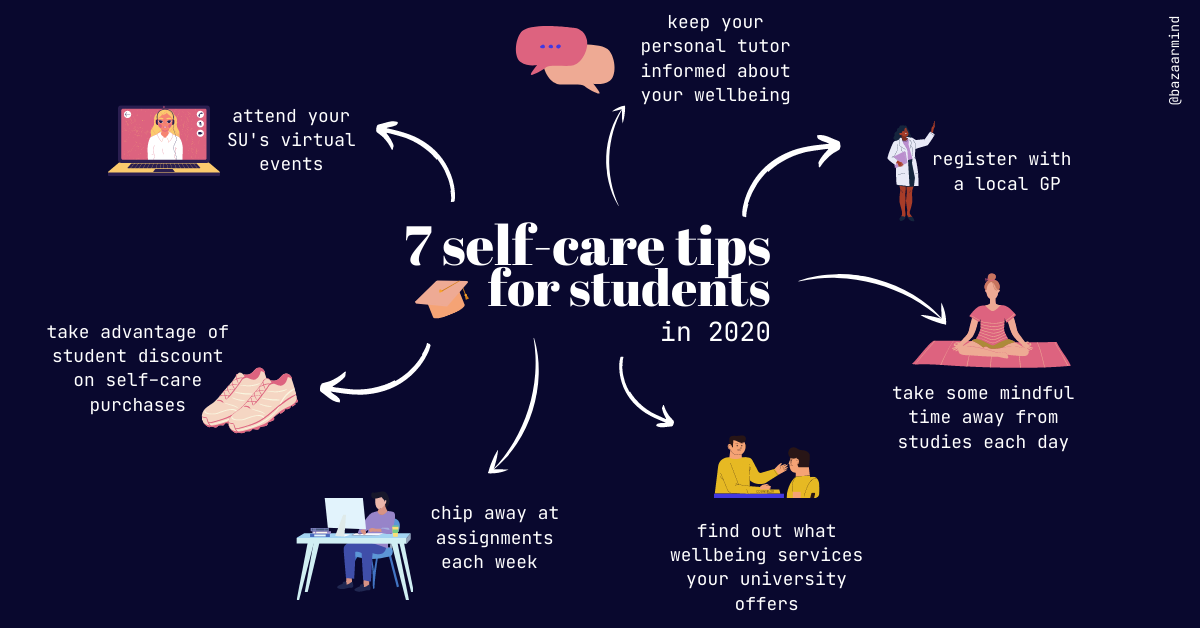7 self-care tips for students in 2020.
Rachel Walton | Published: 17th November 2020
2020 has been a challenge for students all over the UK. From confusing A Level grades to student lockdowns, this year’s class have experienced a lot of upheaval. If you’re a student negotiating the many curveballs thrown by this strange year, read on to get our wellbeing tips to see you through it.
1. Talk to your Personal Tutor. 💬
Your personal tutor can signpost you to a lot of valuable places. While they might also be one of your course tutors, their role is not limited to your course. Their role is to act as a personal contact who can support you and put you in touch with other areas of the university as and when needed.
If there’s something you’re struggling with, whether it’s workload, financial trouble, or mental health concerns, speak with them about what the university can do to help. They might be able to help you with extensions, hardship funds, and a wide range of support options.
2. Register with a local GP.👩🏻⚕️
If you haven’t already done this, it’s important to be registered to a GP you can access quickly if you ever need them. It’s no good being registered with a Liverpool GP if your halls are in London.
You can choose to register with any GP, but it might be useful to choose one that is associated with your university campus. GP’s attached to halls will have more experience with addressing the needs of students.
3. Take some mindful time away from studies. 🧘🏾♂️
The key is ‘mindful’ time away. While it’s fine to spend some time scrolling through your phone or watching Netflix, it’s also important to take conscious time out to be present and check in with how you’re feeling.
Meditation, breathing exercises, journalling, reading, and yoga, are some examples of ‘mindful’ activities that you might want to explore.
4. Find out what wellbeing services your university offers.🧡
Most universities offer a range of wellbeing support options, we might be one of them! You can usually find these on your university website, but it might be better to ask your uni’s student wellbeing team about which options are best for you.
In a lot of universities, you might be offered a contact to help you specifically with mental health and wellbeing. They act similarly to a personal tutor, but they have a more specialised knowledge of the student mental health and the university’s support services.
5. Chip away at assignments each week. 📄
We’ve all left assignments till the last minute, and we’ve all paid the price. If you do experience a period of mental ill-health, you might very quickly fall behind on assignments. This can, for obvious reasons, make things worse.
Try to chip away at a bit of work after each lecture. Not only will it ease the pressure around deadline day, but it gives you a cushion to fall back on if you do need to take some time out due to mental ill-health.
6. Take advantage of student discount. 💸
Student discount schemes like UNiDAYS and NUS offer some brilliant deals. It’s very likely that you’ll be able to get at least a 10% discount with most big retailers.
Money definitely can’t solve wellbeing issues, but having a little less financial stress can help. Whether you’re looking to shave some money off the Christmas gift fund or buy yourself some self-care goodies, it’s best to check for discount codes first!
7. Attend your SU's virtual events. 🖥️
Chances are that your SU has some great virtual events going on right now. Think back to when Zoom quizzes were fun! It might seem like a bit of a let down from the UV foam parties that you were expecting, but it’s definitely worth trying.
Your SU’s are working really hard to make your campuses as fun as possible. Trust that they know how to have a good time. A lot of them are students themselves, you know!
